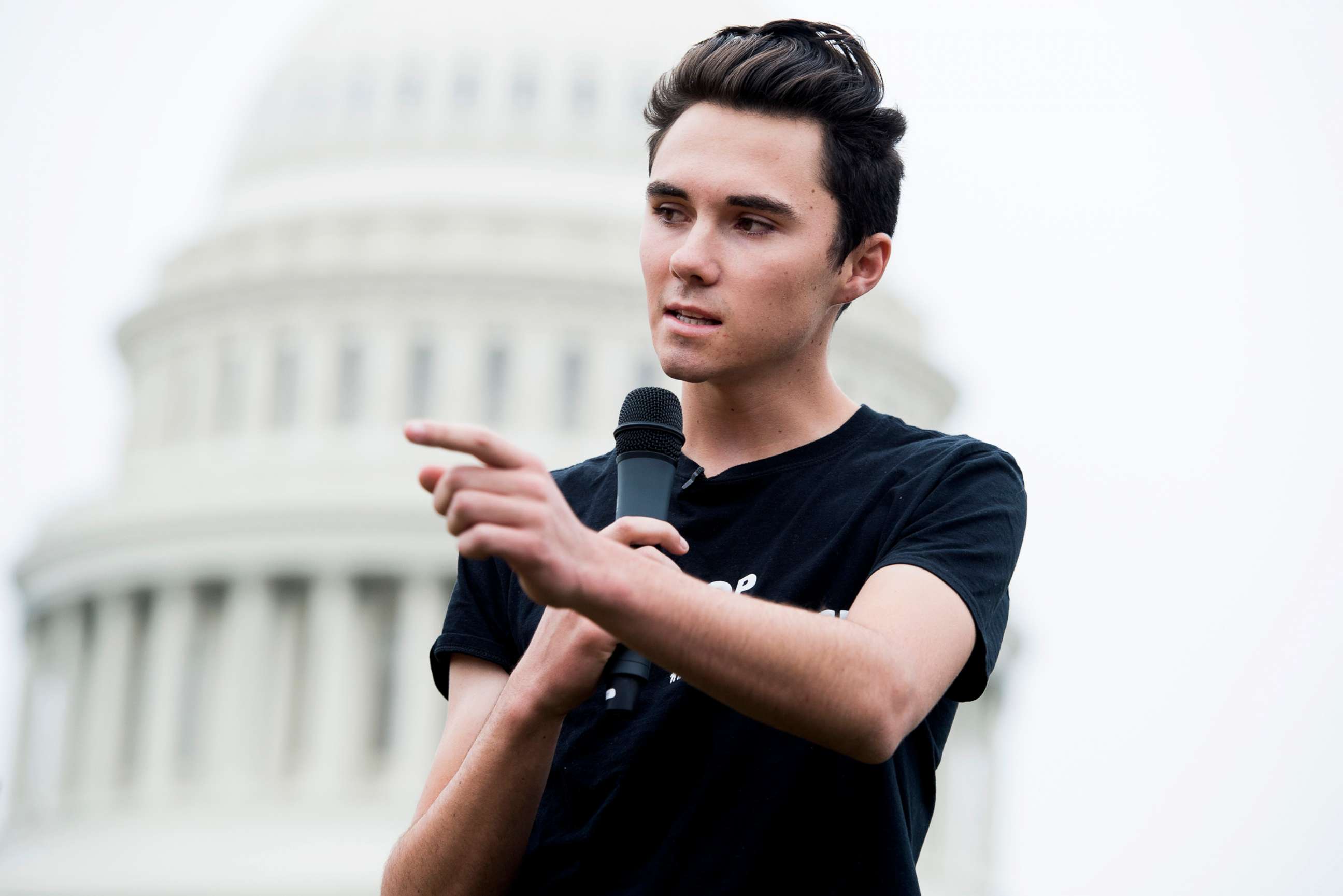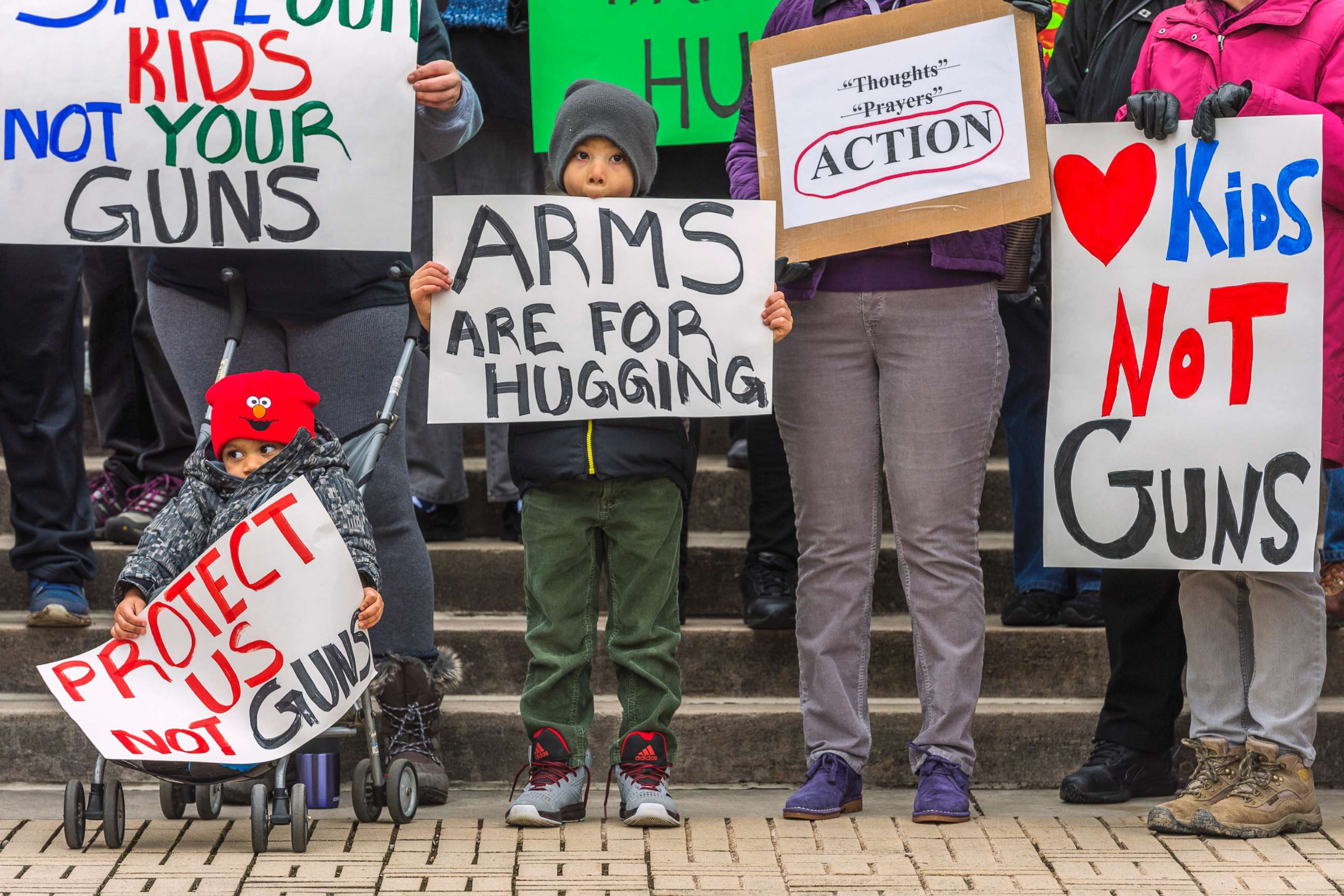Republican Senate holds gun control hearing as students commemorate 'March For Our Lives' anniversary
For many survivors, the march was just the beginning of a long fight for change.
On the heels of gun violence in New Zealand and some high-profile apparent suicides linked to mass shootings in the U.S., a rare event took place in Congress on Tuesday: a Republican-led gun control hearing.
Senate Judiciary Committee Chairman Lindsey Graham, R-S.C., called in experts on extreme risk protection laws, also known as “red flag” laws, which can empower law enforcement to seize guns from people who are deemed a danger to themselves and others.
“What’s clear to me is that recent tragedies in the United States are examples of a common problem -- a failure to identify and lessen the risk from individuals who may be showing signs of distress and the willingness to hurt themselves or others,” Graham said.
The senator found himself in rare agreement with Democrats on the committee in fighting for a gun control measure, particularly in the country’s current heightened current political climate.
“I do think that while we continue to respect and uphold second amendment rights, we need to find a way to deal with gun violence in our country,” said Sen. Chris Coons, D-Del.
Palm Beach County Sheriff Ric Bradshaw testified at the hearing, and told lawmakers bluntly, “You need to identify the people who are going to go and get a weapon and keep that out of their hands. It’s that simple.” He noted that a weapon did not necessarily have to be a gun, and could be a car, knife, or even a pressure cooker.

While the senate was holding their gun control hearing, student survivors of the mass shooting in Parkland, Florida, commemorated the one-year anniversary of the ‘March For Our Lives’ demonstration by traveling to Capitol Hill. Along with other youth leaders, they renewed their call for gun control legislation.
For many survivors like Ryan Deitsch, 19, the march last year was just the beginning of a long fight against gun violence.

“’Never Again’ was a mantra,” Deitsch said. “But it kept happening, and we still fight. But the lack of action permits this tragic reality to exist day after day.”
Deitsch decided to take a gap year after high school to work with the March For Our Lives organization full time as their creator of content.
He said he went to Washington this week with a “heavy heart” as the Parkland community was hit with yet another tragedy -- the death from apparent suicide of two teenagers and fellow Parkland survivors.
The Parkland survivors on Capitol Hill did not speak directly about the deaths, but Rep. Ted Deutch, D-Fla., Sen. Richard Blumenthal, D-Conn. and Rep. Eric Swalwell, D-Calif., expressed their condolences.
“The trauma from gun violence tragedies will stay with our communities,” Rep. Deutch said at a press conference with the students. “We must be ready to respond with our friends, our families, and our neighbors who need help.”
The survivors stood alongside lawmakers and pleaded for the passage of the Background Checks Expansion Act, which if enacted would require background checks on all sales or transfers of firearms.
Survivors later confronted senators directly with letters of support from students across the country for the proposed law.
“I want legislators to remember that young people in this country are here,” Marjory Stoneman Douglas High School sophomore and Parkland survivor Lauren Hogg, 15, told ABC News. “We are watching everything they do with their positions of power.”
In the Senate hearing on red flag laws, Sen. Graham, who is up for re-election in 2020, acknowledged that Republicans rarely fight for legislation that would limit access to weapons.
“There are a lot of people that are worried that -- ‘Is the government going to come and take your guns?’ And the answer is, ‘No, nobody is going to take a gun from you,’” Graham said. “I’m a big fan of the second amendment. I own firearms, and I try to be responsible in my ownership. But at the same time every right has limits.”

Dudley Brown, president of the National Association for Gun Rights, appeared to take issue with the hearing, and attacked Graham at a news conference in the senator’s home state on Monday, calling on gun rights supporters to, "Attach your teeth to Senator Graham's keister. That is what politicians listen to. When they feel the heat, they see the light,” The Greenville News reported.
Fourteen U.S. states have red flag laws, including one enacted just after the shooting in Parkland.
Graham had initially expressed interest in a federal red flag law, though at Tuesday’s hearing, he acknowledged it would be “probably more than the market could bear.”
Finding a balance between public safety and constitutional rights has dogged Congress for years. Since the Parkland shooting, however, the U.S. House of Representatives approved a federal background check bill, the Trump administration issued a rule banning bump stocks, and state lawmakers enacted more than 60 new gun safetylaws within six months, according to the Giffords Law Center.
In the senate hearing, under questioning from Sen. Chuck Grassley, R-Iowa, who expressed concern that red flag laws might infringe on constitutional rights, Dave Kopel, research director for libertarian think tank Independence Institute, said “anti-gun advocates would probably say that any citizen with a gun is a danger.”
Kopel added that while he supports extreme risk protection laws, he thinks the standards for weapon confiscation must be high, and that an individual should present “an extreme danger, not simply a danger.” He also advocated that any person in a weapon-confiscation court proceeding should have a right to cross-examine their accuser, and that a civil remedy be available for false and malicious accusations.
Meanwhile, “March for Our Lives” commemorators erected a pop-up art installation on the lawn of the Capitol that highlighted gun violence prevention. Called “A Week in America,” the exhibit honors the 735 people killed by gun violence each week, including 105 children, the group said.
Lawmakers on the Senate Judiciary Committee repeatedly referenced the Parkland shooter Nikolas Cruz, and his disturbing social media posts and other questionable behavior, as they pressed the case for red flag laws.
Chairman Graham noted that Cruz “really did everything but take an ad out in a newspaper” saying he would be taking violent action.
“While law enforcement could have done more, this young man’s family could also have helped if they had been legally able to do so,” said Sen. Feinstein, D-Calif., and the top Democrat on the panel.
Florida -- soon after the shooting -- enacted its own red flag law, and Graham asked if would have mattered if the law had existed before the Parkland shooting.
“Absolutely,” responded Sheriff Bradshaw. He asked lawmakers to push law enforcement around the country to get mental health experts involved on their teams.
Graham said the evidence on how red flag laws work “is pretty impressive,” pointing to Broward County, where 108 people were impacted, including 28 cases where the person was convicted of domestic violence.
Ronald Honberg a senior policy advisor from the National Alliance on Mental Illness, attended the hearing Tuesday.
“I think it’s really important not to paint extreme mental illness with an overly-broad brush,” he said. “What I like about these laws is that they really provide as close to an evidence-based response as possible…better than anything I’ve ever encountered.”
ABC News' Jacqueline Yoo contributed to this report.




